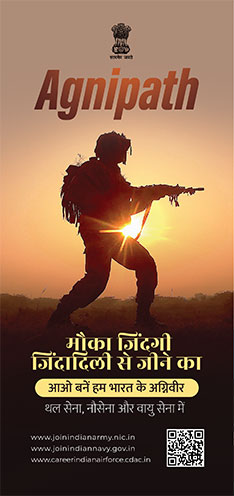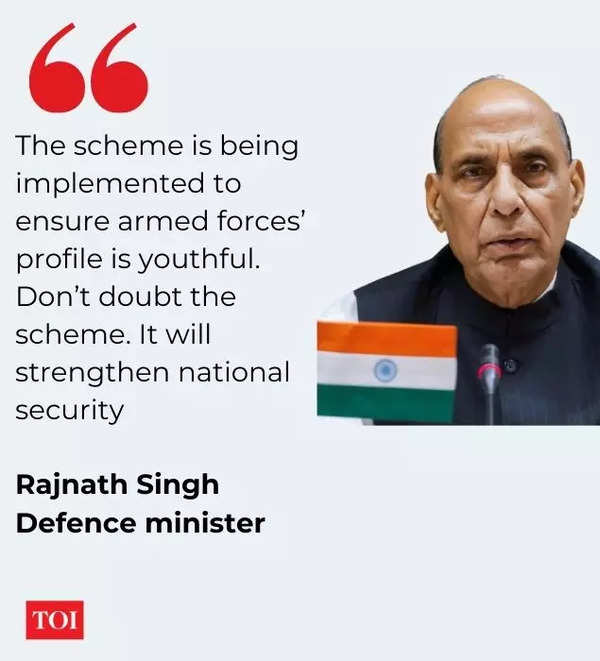Imagine yourself at the fresh age of 18, getting the opportunity to serve in the Indian Armed Forces, does that fill your chest with pride and hope? It does so for legions of young men and women in India, who one day aim to defend the country that gave them a livelihood their whole life. And that wasn't too difficult. People who enlisted in the armed forces as soldiers were sent for physical evaluation, If they passed, they received recruitment for fifteen or more years. Sounds good, right? A guaranteed job, and not a normal one, mind you, a one which will leave every enlistee with pride and a sense of accomplishment. And that's not it, they receive a good pension until they die, along with many other benefits that would make their life immensely comfortable.
So what was the problem?:
All this sounds good, so why was the old form of selection of jawans scrapped? The Government of India cited reasons such as 'ensuring the armed forces had a youthful force capable of harnessing technologically advanced defence machinery and having a fighting spirit in case of conflict.' But we believe it is all a way to reduce the huge bill the Government receives every year in order to pay the aforementioned pension. See, every year, close to 60000 military servicemen retire. So, the amount of money allotted to paying pensions keeps soaring each year. But, of course, who needs experienced soldiers when the experts think they can have fresh-faced recruits who think technology is an app on their phone and believe 'fighting spirit' comes from a video game and can be learnt in a fortnight? Either way, whatever the reason was, the old recruitment process of jawans was scrapped and in June 2022, popularised by the then Chief of Defence Staff, late General Bipin Rawat, the Agneepath scheme, promising to revolutionize the military hiring process was introduced. It was a Tour of Duty scheme, which means that soldiers were hired for a relatively short period in order to accomplish certain focused tasks. The jawans hired in this manner were christened the name Agniveers.
It was advertised as a fast-track way to recruit soldiers for a short-term period. Afterwards, the recruits are put into entry-level positions, to be lead by the officers of the armed forces.
Does this scheme have advantages?
Come on, we're not anti-government agents. We don't simply hate on the scheme. It does show some promise. For example, Agniveers who perform exceptionally well will join the permanent cadre in the armed forces, with potentially lifelong employment.
If you are an Agniveer who isn't part of the permanent recruits, at the end of the four years, you will have a head start in life, as many states and ministries have pledged to give ex-Agniveers priority in hiring. I'll even list examples:
- Union Defence minister Shri Rajnath Singh has approved reservation of approximately 10% for Agniveers in jobs in the Ministry of Defence, including the Coast Guard.
- Home Minister Shri Amit Shah has also proposed a reservation of 10% jobs in the Central Armed Police Forces.
- Similar proposals have been pledged by the likes of the Ministry of Civil Aviation, the honourable State Government of Haryana, Ministry of Petroleum and Natural Gas and Ministry of Housing and Urban Affairs.
Sounds like a win-win situation, right? Except, of course, for the minor detail of turning the recruitment process into a revolving door where soldiers might be more concerned about their post-military job prospects than defending the nation. But hey, who needs a stable, experienced military force when you can have a fresh batch of recruits every four years? It’s like a never-ending military internship program, where every few years, you get to train a whole new batch of enthusiastic, albeit inexperienced, soldiers. What could possibly go wrong?
And let’s not forget the bureaucratic efficiency that will surely make all these job reservations and technological upgrades happen seamlessly. After all, if there’s one thing our government is known for, it’s their lightning-fast implementation of new policies and their uncanny ability to flawlessly integrate technological advancements into existing structures. So, cheers to the Agnipath scheme—because who doesn’t love a good dose of uncertainty with their national defense strategy?
Okay, the maybe let's tone down the satire and actually see why the public is revolting.
So where the hell is the problem?
Mind you, only 25% of the Agniveers will be enlisted for full time service in the military. The rest will be given a 'gratuity' of Rs 11,71,000 as a 'head start' to the rest of their so-called 'golden lives'. This is the only money they will ever receive for their time in the military, and no pension whatsoever will be provided. This is a much smaller amount than you might think for a person aged 21 who was just released from the armed forces.The promise of jobs doesn't interest the fighting spirit among the youth who want to serve the nation, who's aim is not to get simple civilian jobs. It weakens the spirit of combat usually found in defence servicemen. Also, the meager training period of half a year isn't nearly enough to manage the complex defence tech.
Another fact is, in other countries, Tour of Duty schemes have a 4 year service period followed by a 4-5 year reserve period, unlike the Agnipath scheme, which simply discharges 75% of the servicemen.
The Seva Nidhi isn't a good enough amount either.
Conclusion:
So, the Agnipath scheme isn't a total mess though. With adjustments to the Nidhi amount, the percentage of Agniveers retained to at least 50%, a small pension amount, and a better training period, the public will start to see the good in the scheme and approve of it. Because who wouldn't be thrilled about a military career that promises you a swift kick into the civilian job market after four years, right?
One more point, though various ministries have promised a better future to the cadets who don't get retained, it will be better if the Government sets up a Placement Organisation to better give the un-recruited cadets a safe future, instead of leaving them to search careers by themselves, as simply giving incentives to someone and not actually guiding them, especially those who willingly gave 4 years of their lives to be on the frontlines of the nation's defence forces, is simply not enough of a gratitude. Ah yes, nothing says 'thank you for your service', quite like a handshake, a pat on the back, and a map to the nearest job fair.
Hope the blog gave you a true and meaningful insight into the controversial Agnipath scheme. Stay tuned for more informative blogs, some pretty solid ones are on the way :)
And shout out to my man Kiki for having done such a splendid research on the topic, helping me to write this blog to aid you, the viewers understand the crux of the issue.
Credits:
India Today
TOI
Hindustan Times
Wikipedia
Mohak Mangal - https://youtu.be/OiqSxdARCu4?si=Wn8dazH2Kn3lHRxu


Comments
Post a Comment